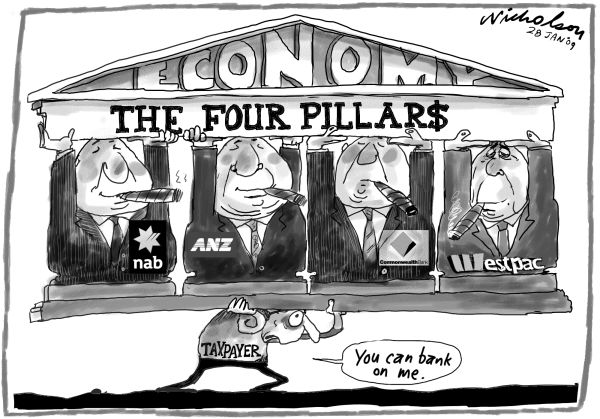Search
Democracy Links
Member's Off-site Blogs
licensed to steal .....

from Crikey .....
There's plenty Rudd could do about CBA's gouging
Adam Schwab writes:
The Prime Minister and Treasurer have expressed their fury, publicly anyway, towards to the Commonwealth Bank for daring to increase its variable home loan rates by 10 basis points independent of any move by the Reserve Bank. Kevin Rudd implored CBA to "join us and don't head in the wrong direction ... I think it would be good if everyone was on board for that."
For our Prime Minister, it seems solving a global depression is no different to encouraging a good turn out for the local church working bee.
While the most public form of gouging, the CBA's action in lifting variable rates marginally is a mere talisman for the banks treatment of customers in general. Less publicly (but more understandably, given the current state of the bond yield curve), the CBA has also raised rates on fixed loans to 6.69% (three years), 8.09% (10 years) and 8.19% (15 years).
Further, while the majority of interest rates cuts spurred by the RBA have been passed on to mortgage-holders (prompting a mini-property boom, especially in the more affordable housing sector), businesses and credit card rates have barely moved (or in some cases, even increased).
Cynics would suggest there are less votes in speaking out on behalf of small business -- it's only when working families have to pay a few extra dollars a week that suddenly the Federal Government shows any sort of interest in bank's interest-rate margins. (The Federal Government was also none-too-concerned when various local and overseas banks were happy to tip asset-rich Oz Minerals into a fire-sale of assets to Chinese state-owned miners).
Unsurprisingly, the Commonwealth Bank claimed that last week's rate rise was due to increased wholesale funding costs, with The Australian reporting that CBA's head of retail products, Michael Cant, noted that the bank was rolling over long-term wholesale funding lines at 13 times the cost that prevailed before the financial crisis, while "every three-month period, [the CBA's] average cost of funding is increasing by around 10 basis points, and [it continues] to absorb some of that [itself]."
The hard luck story may be more believable had the Commonwealth Bank not reported record earnings (net profit in 2008 was up 7% to $4.8 billion) while paying its executive team more than $30 million last year; CEO Ralph Norris personally collected $8.7 million in 2007/08. For some reason, unlike most other businesses, even in a global downturn, the banks feel it appropriate to use their oligopoly power to maintain (and even increase) margins.
Of course, there are plenty of things the Federal Government could do to ensure that Australia's banking cartel aren't able to earn billions from its unique (and highly regulated) position. For a start, the Treasurer could impose laws to prevent banks from charging any fee which is not commensurate with their underlying costs. That is what the common law says, but is consistently ignored by financial institutions. Last year alone, the large banks earned more than one billion dollars from legally dubious penalty fees.
The Federal Government could also remove the significant taxpayer funded advantages enjoyed by banks -- notably, the guarantee on wholesale funding and retail deposits, both of which serve to lower the banks' cost of borrowing.
Alternatively, the Treasurer could regulate the remuneration of bank executives while their institutions receive government guarantees on deposits and wholesale funding. While such a move would no doubt enrage the Business Council of Australia and Australian Institute of Company Directors (and of course, the multi-millionaire executives themselves), arguably, any business which significantly relies on taxpayer help to survive and prosper, should also be liable to those very taxpayers for the lucre dolled out to the hired help.
There is no doubt that the CBA will ride out the public relations storm over the coming days (and may be helped out by the others bank stealing the limelight when they inevitable follow suit and increase their own variable rates), while the Federal Government will continue to do nothing to curb the power of Australia's banking cartel.
Don't pay too much attention to Rudd, Gillard and Swan's ostensible fury. With taxpayers bankrolling their deposits, the Federal Government remains the banks' best friend indeed.
- By John Richardson at 15 Jun 2009 - 9:00pm
- John Richardson's blog
- Login or register to post comments
Recent comments
41 min 14 sec ago
46 min 47 sec ago
3 hours 17 min ago
20 hours 47 min ago
21 hours 4 sec ago
21 hours 49 min ago
22 hours 39 sec ago
23 hours 8 min ago
1 day 58 min ago
1 day 1 hour ago